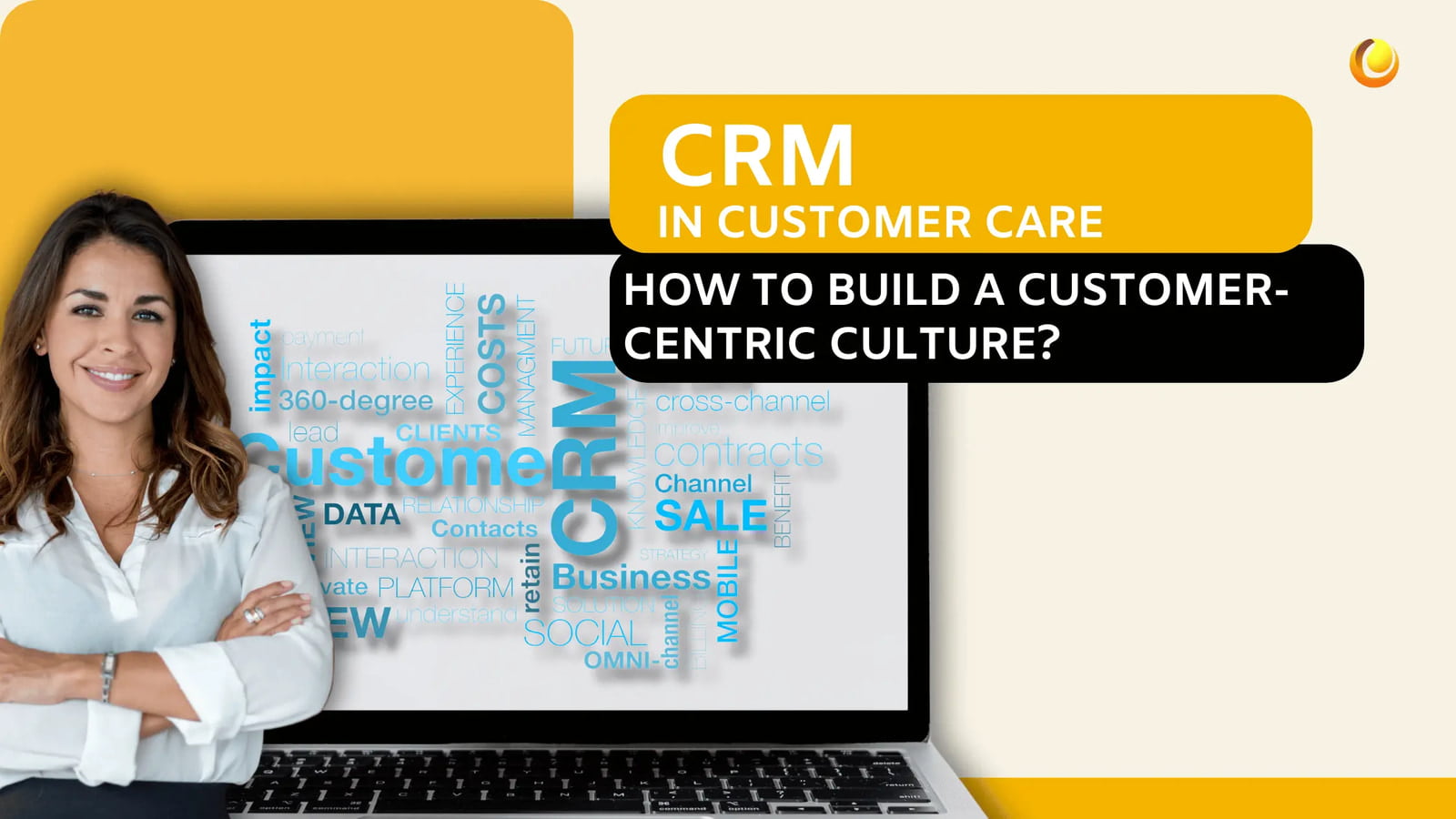
Introduction
Customer care is the biggest difference between a growing business and one that struggles. For a business that is sustainable-growth and long-term-oriented is no longer something optional to be achieved through slogans like "customers first." Creating a customer-centric business is fundamentally a different kind of organisation, supported by the right tools and systems.
END. That is where a robust CRM platform becomes an invaluable asset. Going far, far beyond the capabilities of an electronic version of the Rolodex, modern CRMs act as intelligent systems that enable businesses to know, interact with, and develop customers on a much deeper level. In the right hands, CRM solutions enable organisations to morph customer care from a support function into a central strategic business asset. And you also need to find best CRM for your business.
Let’s start our guide on how to utilise a customer-centric culture through CRM. I use examples and advanced insights for business owners eager to unlock the entire potential of customer care.
The Business Case for a Customer-Centric Culture
A customer-centric culture is an extremely prised return driver, working its way into almost everything from customer loyalty to bottom-line growth. But it's not merely fulfilling the transaction. Rather, it's through long-term relationships that result in repeat business, brand loyalty, and organic growth. With so many choices today, the consumer has more power than ever; it's the customer-centric companies that will promise to deliver on value, time in and time out.
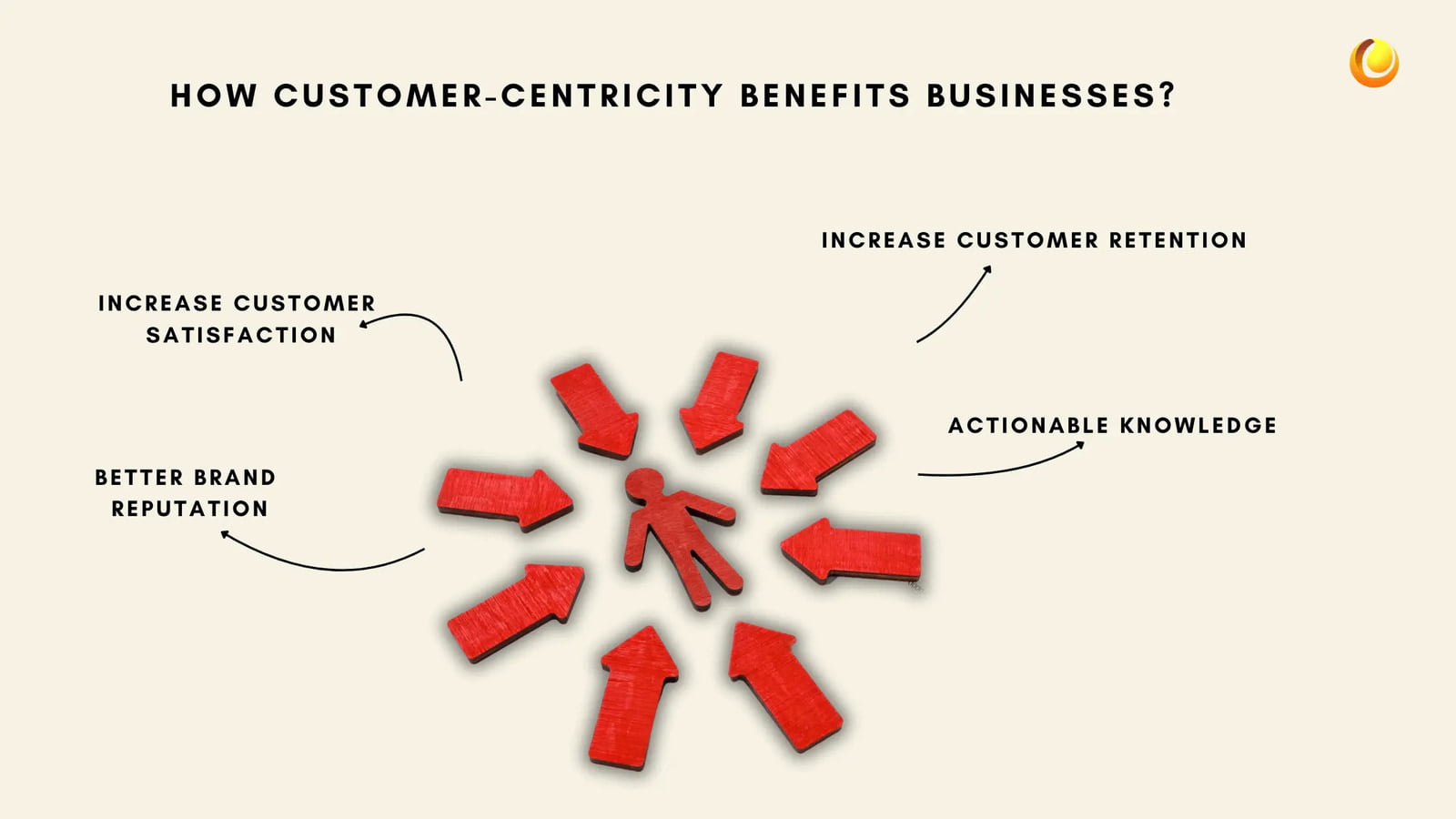
How Customer-Centricity Benefits Businesses?
Increase Customer Retention: Customer retention is much more cost-effective than bringing customers on board. A customer-centred culture will make its clients feel valued, bring in return customers, and increase their lifetime value. Sometimes retentions are more valuable than acquisition. If you know how to increase customer retention, you business can definitely get benefit.
Increase Customer Satisfaction: A sustained focus on customer needs leads to increased customer satisfaction rates as reflected through online reviews, recommendations, and positive word-of-mouth.
Better Brand Reputation: A company that places the customer at its core creates a good reputation. Such reputation can be exploited as free media publicity, strong customer trust, and a competitive advantage.
Actionable knowledge: Responsive customer care and the strategy in which every member of the sales team uses his skills for the better service of customers is required.
The Role of CRM in Enabling Customer-Centricity
For most companies, CRM systems are a linchpin of customer-centricity. The core role of a CRM is being an enterprise's single source of truth about all things customer, centralising data from across departments to give a 360-degree view of each customer. From there, it enables deeper engagements, personalisation, and smooth problem-solving-all which form the bedrock of good experiences.
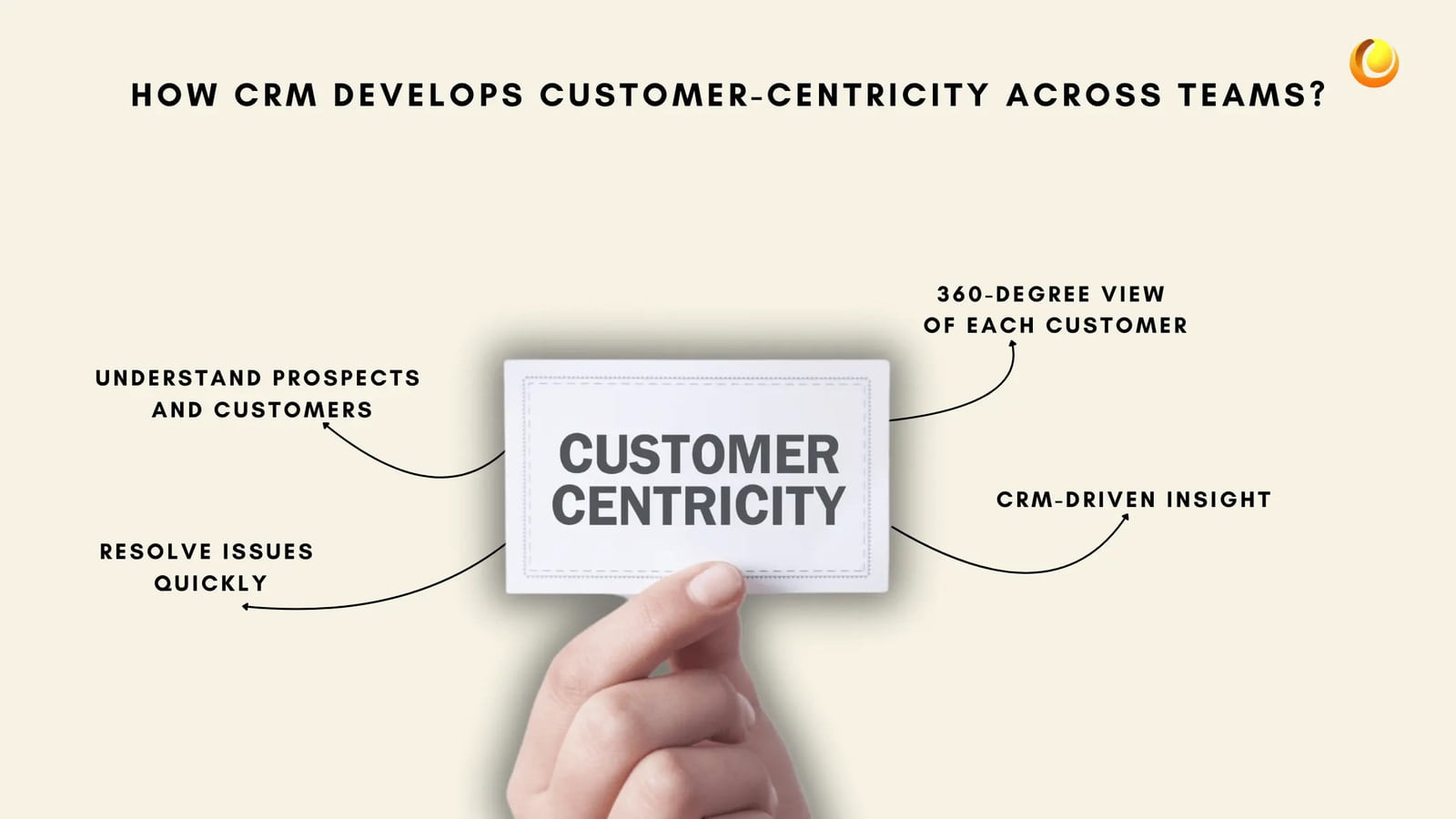
How CRM Develops Customer-centricity Across Teams
Marketing: With CRM-driven insight, marketing teams can provide truly targeted, personalised campaigns that feel relevant to every customer because they increase engagement and conversion.
Sales: A CRM lets sales teams understand prospects’ and customers’ backgrounds, needs, and preferences, empowering them to offer tailored solutions that feel authentic.
Customer Support: By consolidating customer histories, support teams can resolve issues quickly and empathetically, leading to increased satisfaction and loyalty.
When CRM is at the core of customer care, each function works together, responding in a coordinated manner that achieves enormous familiarity with every customer.
Key Features Of CRM That Make Customer Care Shine
To build a customer-centric culture, one needs to embrace CRM capabilities to nurture holistic customer care. Among its key features are those that strive to foster proactive involvement and therefore streamlined communication and personalisation of interactions.
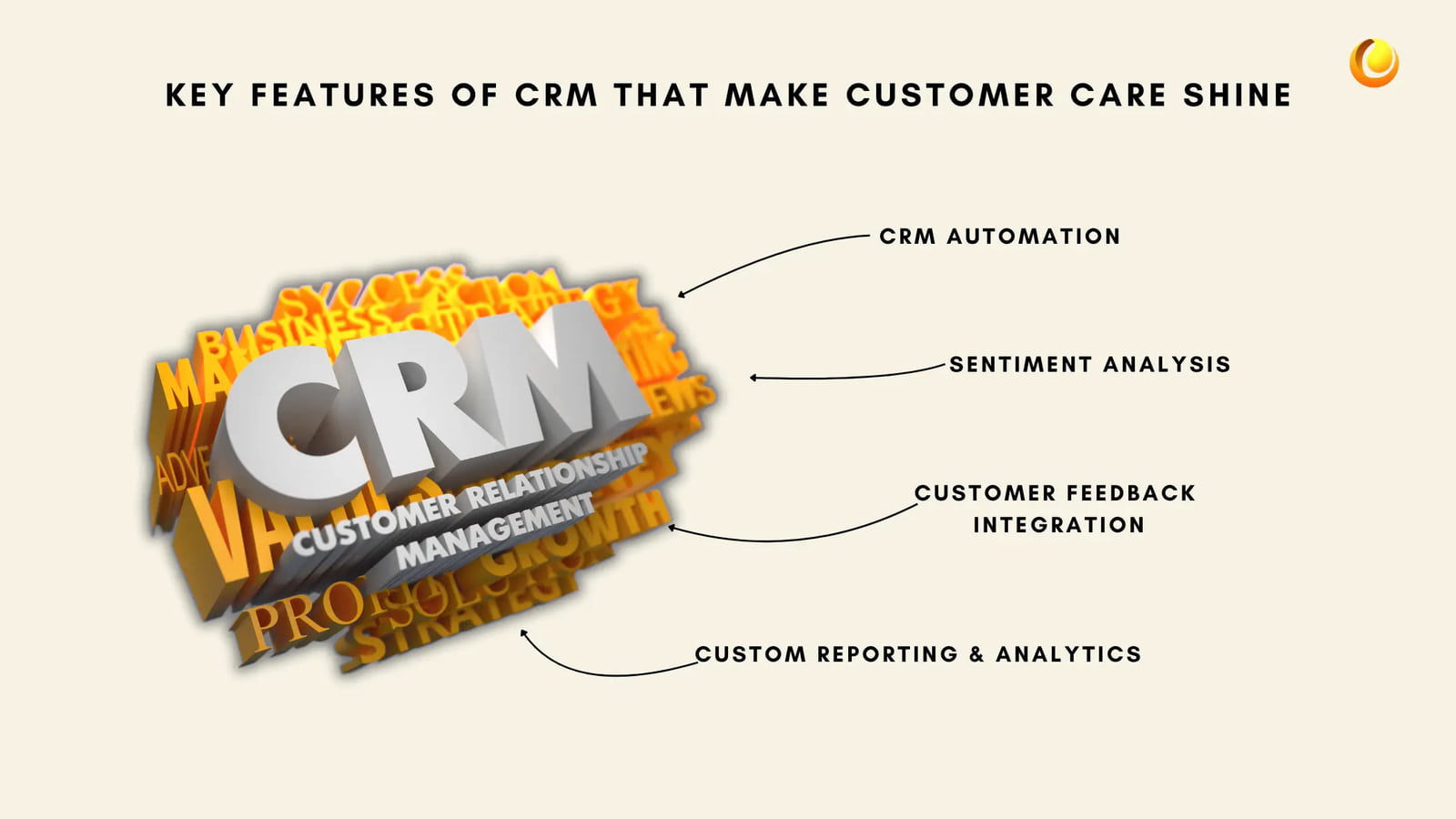
360-Degree Customer View
A 360-degree customer view is all information regarding a customer in one accessible profile, from purchase history and support tickets to browsing behaviour and communication preferences. A consolidated view will, therefore, help the employees see the full context of each customer's journey, thereby enabling empathetic, informed, and relevant responses to their queries.
Let's say a customer e-mails your support team expressing dissatisfaction with something related to a product. A 360-degree view allows the agent to immediately view the history of purchases by the customer, recent interactions, and open problems. The agent is thus in a position to come out with a fast and simple resolution that will prove to make the customer feel understood, making a bad experience positive.
CRM Automation for Consistent and Timely Customer Care
The automation within a CRM helps to take care of daily recurring tasks such as sending emails or reminders and reminding at the right time. This gives customers the feeling of being taken care of all along the way through this journey. Automation of these routine interactions can save precious customer-care representative time while ensuring that the customer hears at the right time, or all other messages are heard in a manner that shows consistency.
An example can be the automation of follow-up requests on open support tickets or welcoming new customers with customised messages. This would come out as a huge value add to the customer experience because it continues to take the conversation further with minimal intervention.
Sentiment Analysis and Customer Feedback Integration
In a customer-centric organisation, the requisites of continuous improvement rest on feedback. Advanced CRMs that could possibly analyse sentiment offer tracking across touchpoints to demonstrate how customers feel towards products and services. In this manner, companies should be aware of insights in real-time for teams to spot dissatisfaction early and address it proactively. Customer-centric culture completely depends on customer care, so you have to take care of customers’ sentiments.
Sentiment analysis CRMs can review text-based interactions such as emails and social media comments to measure a customer's sentiment. For example, if there is an unexpected rise in negative sentiment, it could reflect a problem with some recent update to their product. Then, the teams can address the issue before it impacts a larger number of customers. Including feedback and sentiment data in CRM strategies enables companies to change their approach to stay responsive to customers' needs.
Business Valuable Insights from Data Powered by Custom Reporting and Analytics
CRM analytics provides tremendous insight in enabling a business to recognise trends, spot potential issues, and make sound decisions. With reports on individual metrics such as customer engagement and support performance, along with conversions, businesses get visibility into every step of the customer experience.
For example, if CRM data points out several complaints concerning a specific product, then the company can proactively address the issue before future complaints are directed to the company. Additionally, analysis over time of customer contacts reveals important patterns that would, for instance, reveal frequent pain points and popular channels of service, thus resulting in more effective planning for service to the customer.
Empower Employees to Provide Customer Care Excellence
The right resources and information empower employees with customer-centric values. A CRM system empowers customer-facing people to look at real-time customer data so that they can personalise interactions and solve issues promptly.
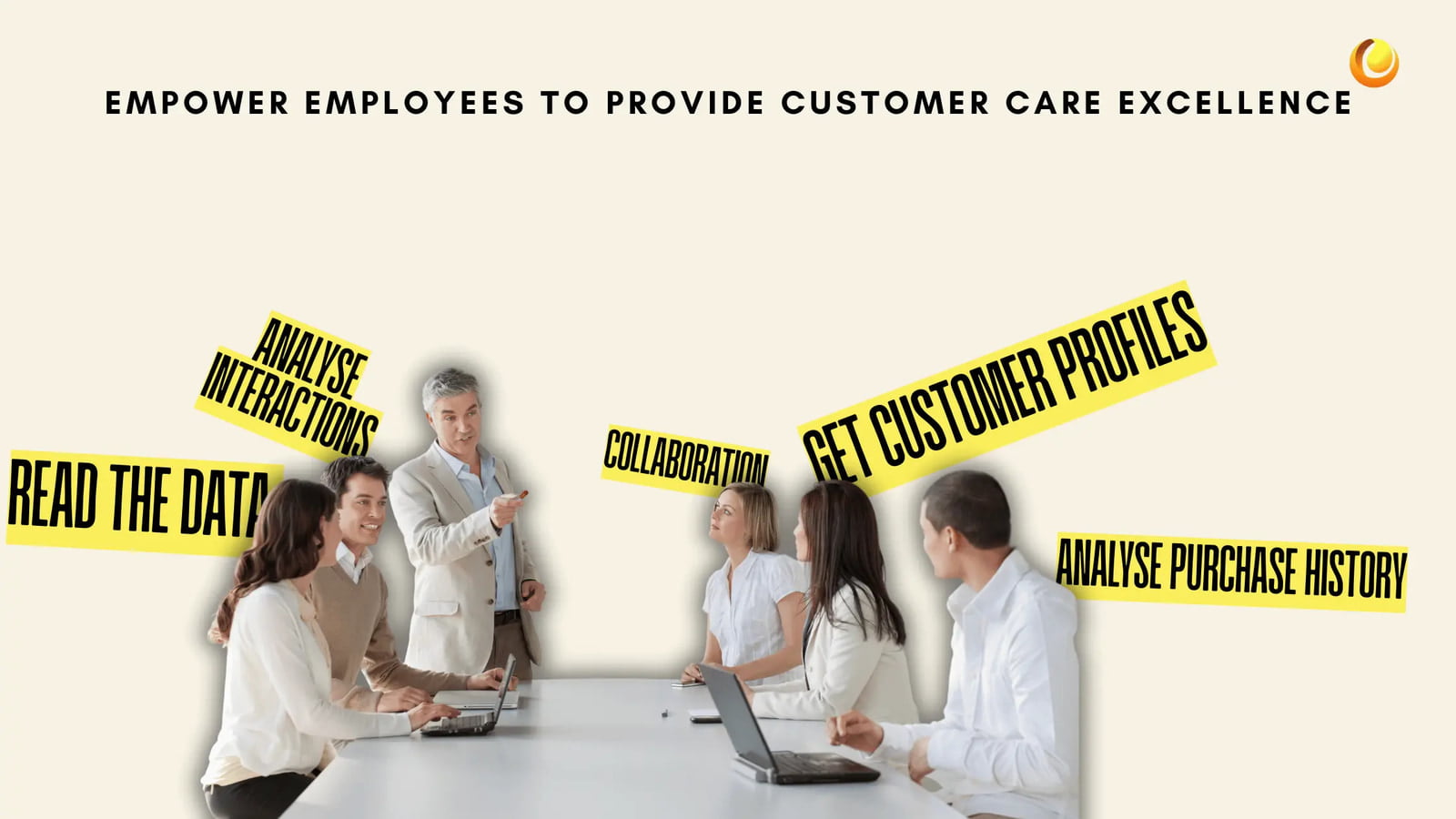
Training for Using a Customer-Centric CRM
However, it is of utmost importance that the employees know how to read the data provided by a CRM and use it. Thus, training staff on the use of the CRM to get customer profiles, analyse purchase history, or check past interactions so that the product delivered would be more responsive and personal, becomes important. The CRM now can act as a friend who feels what the customer had at his journey point and understands the context better.
Providing a Seamless Collaboration Environment
A CRM also enables interdepartmental collaboration, which is pivotal in ensuring smooth customer care. Marketing would be able to see what products one customer is interested in, and sales teams can obtain the same data to frame their approach. Customer service, on the other hand, will be in a position to see what is coming from sales calls so that it would be able to respond appropriately with greater sensitivity and accuracy. This integrated approach thus communicates to the world that this is a company that cares for its customers.
Effective CRM and Customer-Centric Implementation in Practice
CRM can significantly affect a business's customer care approach. The following companies have utilised CRMs to successfully integrate their customer-centric cultures.
Amazon: Known for its satisfaction rate, Amazon makes use of CRM data through suggestions based on purchases and browsing history. Such personalisation creates a seamless experience to keep customers interested in an organisation and build strong loyalty to the brand.
Apple: CRM systems support not only customer service but also the Genius Bar at Apple. On a customer's first visit to an Apple store, the whole detailed profile with everything he has bought and with which problems before might be available to the service teams. Then, they would present employees with proactive solutions to enhance the quality of care this kind of brand conveys.
Airbnb: This uses CRM intelligence to understand the needs of the hosts and the guests. This would imply that after knowing the needs of the guest and the host, the company would be able to give them support and aid in due time and also offer customised services, which implies trust through this CRM approach would help Airbnb maintain the best of the customer care services.
These examples depict the kind of benefits a company could experience by implementing CRM for customer-centric strategies across disparate industries. A well-implemented CRM approach means companies are well-equipped to know their customers and relationship nourishment alongside positive interaction.
You can edit text on your website by double clicking on a text box on your website. Alternatively, when you select a text box a settings menu will appear. your website by double clicking on a text box on your website. Alternatively, when you select a text box
Building a Feedback-Driven Culture with CRM
An open feedback culture is what drives customer-centric orientation: the observation of customers and responses to such observations. This view considers a CRM system as an integral part of the feedback loop where insight collection can be done through various channels—surveys, social media, and customer service interactions—and incorporated within a customer care strategy.
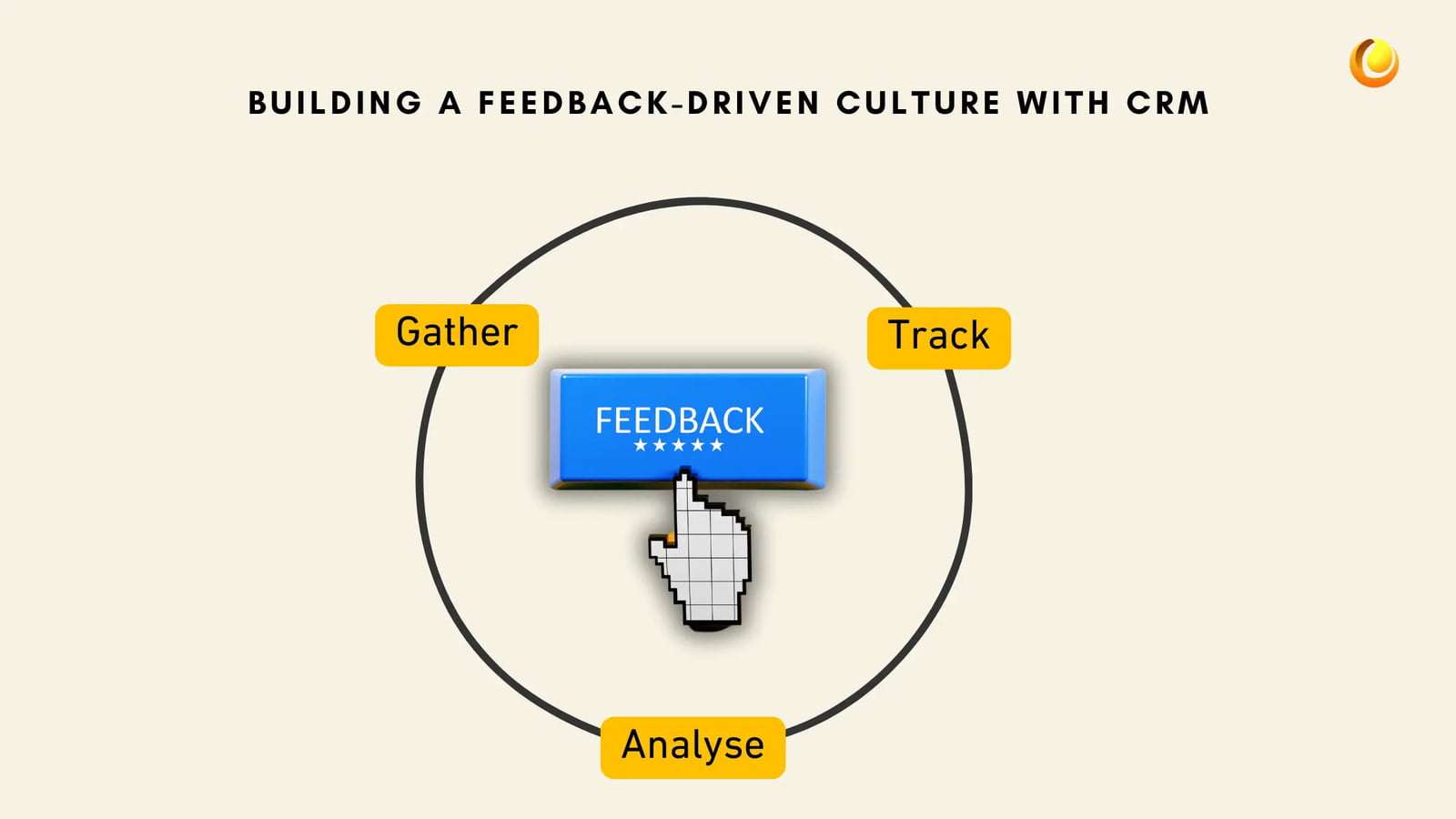
Customer Feedback Collection
About Centralised Channel Gathering, Tracking, and Analysis: CRM systems provide a centralised channel for gathering, tracking, and analysing the sentiment of customers. For instance, a CRM can aggregate responses from customer surveys, social media comments, and direct feedback from support tickets that give a complete picture of customer sentiment. Using this information, businesses can discover patterns and insights that reveal areas for improvement or new opportunities to better serve customers.
Implementing Changes Based on Feedback
The only use of giving feedback is positive action. A CRM system could reflect how many times similar themes are repeated in customer feedback, which would clarify before management how to change or improve such things. A business that listens and appears to respond to the consumer's feedback will always put value in customers' pockets through retention. The Organisations that use the feedback-driven model are proven to be concerned with the consumer and interested in service delivery to the public. With the feedback cycle, you can improve your customer care efforts.
Taking Action on a Customer-Centric Culture
Investment will also be seen while adopting the customer-centric culture, but not forgetting that businesses will undergo the journey instead of changing. While implementing CRM, a change in the ways of being cared for the customers is not a one-time exercise but an evolving process to answer the needs, feedback, and expectations of your customers.
Practical Steps for Business Owners to Get Started
Evaluate Your Current Customer Care Processes: Review existing customer care procedures for compliance with a customer-focused methodology. Note areas of potential centralised data, simplified communications or enhanced customer interactions.
Select a CRM That Aligns with Your Business Goals: All CRMs are not equal. Choose only that CRM that offers the best functionalities needed to tailor customer experiences, track customer response, and analyse customer data. There are multiple options that you can choose such as Zoho, Salesforceand Pipedrive.
Train Your Team on Customer-Centric CRM Practices: Engage and enlighten all employees in frontline customer care to know how to use the CRM to access details about customer profiles, follow up on their engagement, and respond empathetically.
Measure Customer Care Metrics: CRM monitors response time, issue resolution rates, scores of customer satisfaction, and net promoter score (NPS) by utilising the reporting feature of CRM. With CRM you can track trends and areas of improvement.
Seek Regular Customer Feedback: Engage your customers through surveys, reviews, and social media to gather insights on how they feel about your brand. Integrate that feedback in the CRM system and create an action plan on the basis of results.
Foster a Feedback-Driven Culture Internally: This is your best opportunity to provide ideas that will help improve customer care. Be sure you build in considerations for customer insights while developing the CRM strategy. Indeed, a culture with everybody actively engaged in initiatives around customer care will greatly contribute to strengthening the commitment to customer-centricity.
What Does the Future Hold for CRM in Customer Care?
Tomorrow's CRM platforms will be intelligent enough to be powered through AI and machine learning where the system would be intuitive in predicting customer needs, working automatically, and providing much better personalisation to the experience. In the near term, businesses with such superior CRM capabilities will be truly competitively positioned and would avoid issues before they become live issues and would provide even intuitively close customer care.
AI-driven features such as predictive analytics, customer sentiment analysis that takes care of itself, and even chatbots can make customer care a lot more effective and efficient. Imagine a CRM that's suggesting a customer's questions or upselling an opportunity based on predictive data, all without human intervention. All these innovations will make CRM an even more strategic centre for any business's customer-centric strategy.
Conclusion
The only way to help a business move ahead toward long-term prosperity is to develop a customer-centric culture, and one cornerstone of that transition involves the CRM system. The creation of an even closer association between the company and its customers through the implementation of CRM tools and strategies enables them to predict the needs of their customers and deliver an unforgettable experience.
Businesses that have been investing in customer-centric CRM strategies will be able to leverage those investments into gaining sustainable growth, intensified brand loyalty, and a reputation for excellence in customer care in today's super competitive market.
Building a customer-centric culture with CRM is not just a matter of improving customer care- it's about using every process, every decision, and every interaction as an opportunity to align with what matters the most: the customer. While great customer care remains the basis of difference for companies, building CRM is not just a tactical move-it's a strategic must for business owners who aspire to lead with impact and to inspire loyalty that lasts.
Thanks for your valuable time. Hope you liked this post. Want to enhance the sales team efforts using CRM? Get in touch with IT Solutions Solved for expert consultation.





